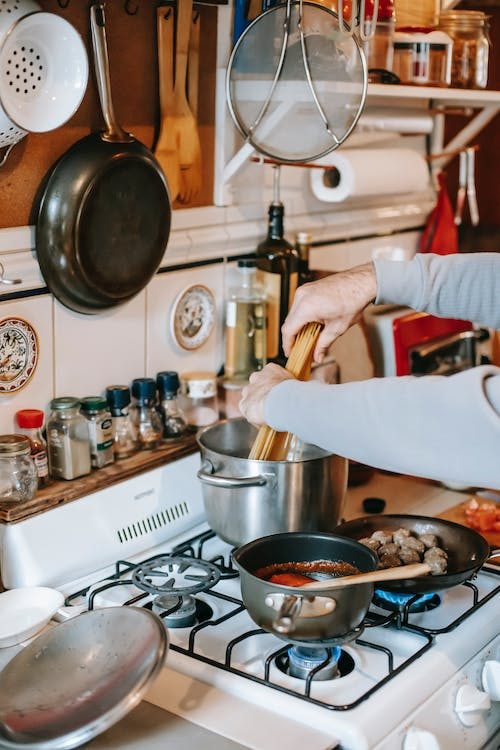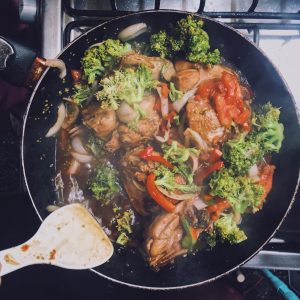| Written by Rebecca Shack, MS, LPC, NCC
For many of us, food and memories can be connected. Whether it be food from childhood
that brings you comfort as an adult or your favorite holiday meal, food plays an important role in our lives. It is a common ground for many. Cooking can also help with our mental health for a variety of reasons!

Reasons why cooking can be great for mental health:
1. It’s a coping skill!
Cooking can be considered a great coping skill because it allows you to gain some control when feeling overwhelmed. When cooking a meal, you choose what ingredients and how much of them you include. If you have had an anxious day, you may then want to follow a recipe exactly to incite a familiar outcome. Or, maybe you want to experiment in the kitchen and use your creativity to calm down. The great thing about cooking is that you have to do it most days, so include it in your daily routine as time to decompress after work. You can even enhance the experience by putting on your favorite movie or music in the background.
2. Brings us together with loved ones
For some of us, when we think back on childhood memories, the kitchen may be involved. Whether it be holidays or family gatherings, food can bring people together. One way to combine socialization and cooking in your life is to invite loved ones to help or even to just enjoy the meal with you. Having people around while you cook, can also incite great conversation that can distract from any stress you have been experiencing. Take some extra time to learn recipes from older family members and find out that secret ingredient they have been hiding. If you have children, you can include them in the cooking process and create new memories.
3. Increases self-esteem
Imagine you try a challenging new recipe and it’s a total success…that positive feeling you gain may boost your confidence not only in the kitchen but also other areas of your life! Think about taking the feeling of achievement with cooking into another part of your life you’re feeling less than confident in. Once you master a recipe, it can become your signature dish. People will associate you with that successful and delicious meal! You have the capability to create your new favorite recipe, it just takes a little time and commitment, as well as an openness to something new! Find your motivation to start cooking, whether it’s as simple as you need to feed yourself after work or you want to try a fancy new recipe you saw on television.
4. Channel creativity

Cooking can be a creative hobby! Mixing unexpected ingredients together can lead to an exciting new recipe. In experimenting with flavors, you may create your new signature dish. Why not dedicate an evening to making a meal with random ingredients you find in your kitchen? Pretend you are on a reality television cooking show and challenge yourself to try a new type of cuisine. Maybe you even create your own recipe book and inspire others to cook. These unique recipes can be passed down to your family and friends, who will then get to continue sharing your creations with others!
If you find yourself or a loved one struggling with mental health, do not hesitate to reach out to a mental health professional. A therapist can help explore your emotions and provide coping skills. Counseling can also assist with understanding the importance of self-care throughout the entire year.
Rebecca believes in the importance of self-care for her clients as well as herself! She enjoys taking walks on the beach, listening to music, trying new foods, and spending time with loved ones.
“My hope for my clients is to help guide them to where they want to be in life. I am here to assist them in creating a toolbox of skills to utilize during life’s difficult moments. The more we pull from our toolbox, the more resilient we become.”
Check out Rebecca’s professional bio here.
Email Us: info@exceptionalwellnesscounseling.com
Call Now: (908) 415-2042
NEXT STEPS & RESOURCES
-
- Are you ready to take your first step? Reach out to us.
- Do you feel you maybenefit from counseling during this time? Take the first step.
- Interested in online counseling? Learn More
- Interested in group counseling? Learn More

